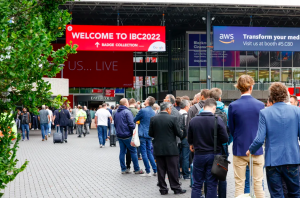
After more than 40 years of operation, DTVE is closing its doors and our website will no longer be updated daily. Thank you for all of your support.
The return of IBC
The return of IBC after its absence from the annual video event calendar in 2020 and 2021 can be termed a success. The show floor was busy and exhibitors DTVE spoke seemed, on the surface at least, to be happy with the quality and quantity of interest in their wares.
On the downside, visitor numbers were significantly down on IBCs of years gone by, but that was probably to be expected, given the combination of post-COVID uncertainty and various economic and geopolitical problems.
However, IBC’s organisers did a good job of consolidating the floor space, as well as the duration of the show, to ensure that everything felt busy.
Ahead of the show, IBC CEO Mike Crimp told DTVE that he had “never seen so much activity around any show in terms of people looking forward and trying to engage with people”.
Crimp correctly anticipated that monetisation of content, as well as creation and distribution, would play a mor prominent role this year, exemplified by technologies to enable the development of FAST and addressable advertising in particular.
FAST is certainly flavour of the moment, and exhibitors with interest in this space remain bullish about its prospects.
Srinivasan KA, co-founder of FAST leader Amagi, told me that FAST’s growth would accelerate over the next couple of years before the market settled into maturity. He said he was seeing more interest in high-value content in FAST, with a market being stimulated by multiple categories of FAST aggregators, including connected TV OEMs, content brands and telcos.
Getting FAST right is complex. Peter Docherty of ThinkAnalytics pointed to the fact that FAST providers can’t know who their viewers are but need to engage them instantly to bring them back. Scheduling, optiimising the order of channels and using data ultimately to create hyper-targeted audience segments for advertisers are only some of the interconnected challenges FAST providers face in monetising their services – over and above the challenges of finding space on platforms and integrating with them.
The importance of partnerships between vendors to deliver effective monetisation was a key theme. VO highlighted its partnership with content aggregator SoFAST in this space, while Broadpeak’s SaaS-based virtual channel creation tool Broadpeak.io has a clear application in this space. Broadpeak announced the addition of dynamic ad insertion to the offering in the run-up to the show.
The growth of connected TV in particular continues to have a significant impact on product development. Xperi’s launch of its smart TV OS and announcement of Vestel as its first customer is one example.
The ever-growing importance of cloud-based technologies to optimise distribution is another key trend from IBC. Harmonic announced the availability of its VOS360 platform on Google Cloud, emphasising its commitment to cloud neutrality. MediaKind, which announced a new headend-as-a-service offering with Arqiva at IBC, takes the view that it should be available on all the major cloud providers, while tapping to Microsoft Azure as a default.
There are nuanced differences of view about how quickly broadcasters and those with legacy infrastructure will move entirely to the cloud.
While cloud-based delivery is now seen as a sine qua non in many quarters for certain key applications, including disaster recovery and handling peaks in demand during live events, others believe the cost advantages of on-premises infrastructure mean a hybrid future for many years to come. More bullish proponents of cloud point to the need also to consider factors such as labour costs associated with maintaining in-house expertise, heating, lighting and monitoring costs as well as the actual cost of space on a server.
The fact remains that most broadcasters have yet to move to the cloud, highlighting the fact that while change is constant in video delivery, in many areas the pace of change is much slower and more measured than headlines from shows such as IBC sometimes suggest.
No review of IBC 2022 could be complete without mention of the chaos that ensued on Monday and Tuesday at Schiphol airport, a testament to fantastically poor decision-making and planning by the relevant authorities. Perhaps it is time for the IBC to take more seriously the idea of moving the show to another city such as Barcelona.


